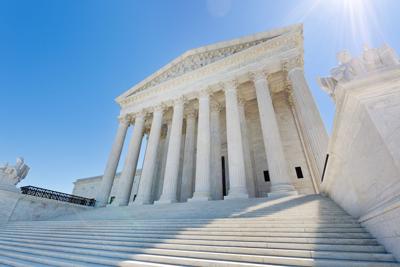In the past three years, 24 states have instituted bans on gender-affirming care for minors.
Before that, every state allowed various treatments for transgender youth with parental and physician approval — including hormones, puberty blockers and in some cases surgery.
Chase Strangio, co-director of the American Civil Liberties Union LGBTQ & HIV Project, pointed out this fact during a Monday virtual press conference. This week, he will become the first openly transgender attorney to argue before the U.S. Supreme Court as part of United States v. Skrmetti. (Arguments in the case are set to begin Wednesday, Dec. 4.)
Legislation limiting health care for trans youth will be heard by the U.S. Supreme Court in December
“What Tennessee has done is to ban hormone therapy and puberty-delaying medication only when those medications are prescribed to allow adolescents to live, identify or appear inconsistent with their sex assigned at birth,” Strangio explained Monday.
“The prohibition is not based on any sex-neutral criteria like risk or evidence of efficacy, but instead on whether a course of treatment departs from what is expected for people based on their sex at birth. We are simply asking the Supreme Court to recognize that when a law treats people differently based on their sex, the same equal-protection principles apply regardless of whether the group impacted by the law happens to be transgender.”
The basis of the plaintiff’s argument is the 14th Amendment, also known as the Equal Protection Clause. Strangio, members of the ACLU of Tennessee, Lambda Legal, a Memphis physician and a Nashville family — among others — are seeking to convince the court that the ban on gender-affirming care for minors singles out and discriminates against the group.
There are several potential outcomes to the case, Strangio added. The U.S. Supreme Court could recognize that Tennessee’s law discriminates based on sex and therefore the court should send it back down to a lower court and require heightened scrutiny — a legal term that brings additional stipulations for a law to be considered constitutional. Another outcome is the highest court applying the heightened scrutiny standards itself, Strangio says, to decide whether the law is likely constitutional or likely unconstitutional. Or the Supreme Court could agree with the lower court that allowed the ban to go into effect.
There’s a possibility that the new presidential administration delays the case, but Strangio says that regardless of whether the Trump administration wants to switch sides (the U.S. is currently on the side of the ACLU and plaintiffs), the basis of the case will not be threatened. In addition, the ruling would not automatically affect the other 23 states, as their laws differ, but it would supply a standard that could lead to changes in their laws.
Patient families confirm appointment, prescription cancellations due to Tennessee law
Nashvillian plaintiffs Brian Williams, his wife Samantha Williams and their 16-year-old transgender daughter LW Williams have been traveling to another state to obtain hormone therapy for LW since the ban was passed during the 2023 legislative session and went into effect in July 2023. She started puberty blockers at 13 years old and hormone therapy at 14, Brian Williams explained Monday.
“We are not expecting anyone to understand everything about our family or the needs of transgender young people like LW,” said Williams. “What we are asking for is for her freedom to be herself without fear. We are asking for her to be able to access the health care she needs, and in her adulthood, knowing nothing is holding her back because of who she is. At the very least, we'd ask others to do what we did all those years ago when LW first came out to us: open your hearts and listen.”







